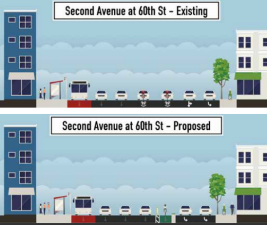DOT Proposes Filling the Gap in Second Avenue Protected Bike Lane

If you ride on the Second Avenue protected bike lane through Kips Bay, you know it can get a little hairy on the way downtown: The section between 23rd Street and 14th Street has no physical protection. On this stretch, the barrier of parked cars yields to a narrow painted buffer, creating an opportunity for illegal parking and offering minimal separation from speeding drivers. Under a DOT plan [PDF], that gap could be filled to create a continuous protected bike lane from 34th Street to 2nd Street.
The plan calls for adding a parking lane to this stretch of Second Avenue, creating protection for the bike lane as well as space for painted pedestrian islands. At intersections where drivers turn left, it includes mixing zones where turning drivers cross the bike lane. Parked cars would take the place of one lane of moving traffic, dropping the number of general traffic lanes from four to three, which matches the configuration south of 14th Street. The Select Bus Service lane on the west side of the avenue would not be affected.
Why the change? Motor vehicle volumes on this stretch of Second Avenue have fallen dramatically in recent years, according to a presentation NYC DOT gave last week to the Community Board 6 transportation committee, and the agency says the new configuration fits the current level of car traffic.
From 2011 to 2013, DOT’s seasonally-adjusted motor vehicle counts between 14th and 15th Streets have shown big drops in mid-week traffic: volumes are down 11.8 percent during the morning rush, 23.1 percent midday, and 15.3 percent during the evening’s busiest hour.
In a sign that car-centric metrics still count at DOT, the presentation notes that the avenue’s “Level of Service” — which measures driver delay — would remain a “B” under the new configuration if traffic volumes hold steady.
